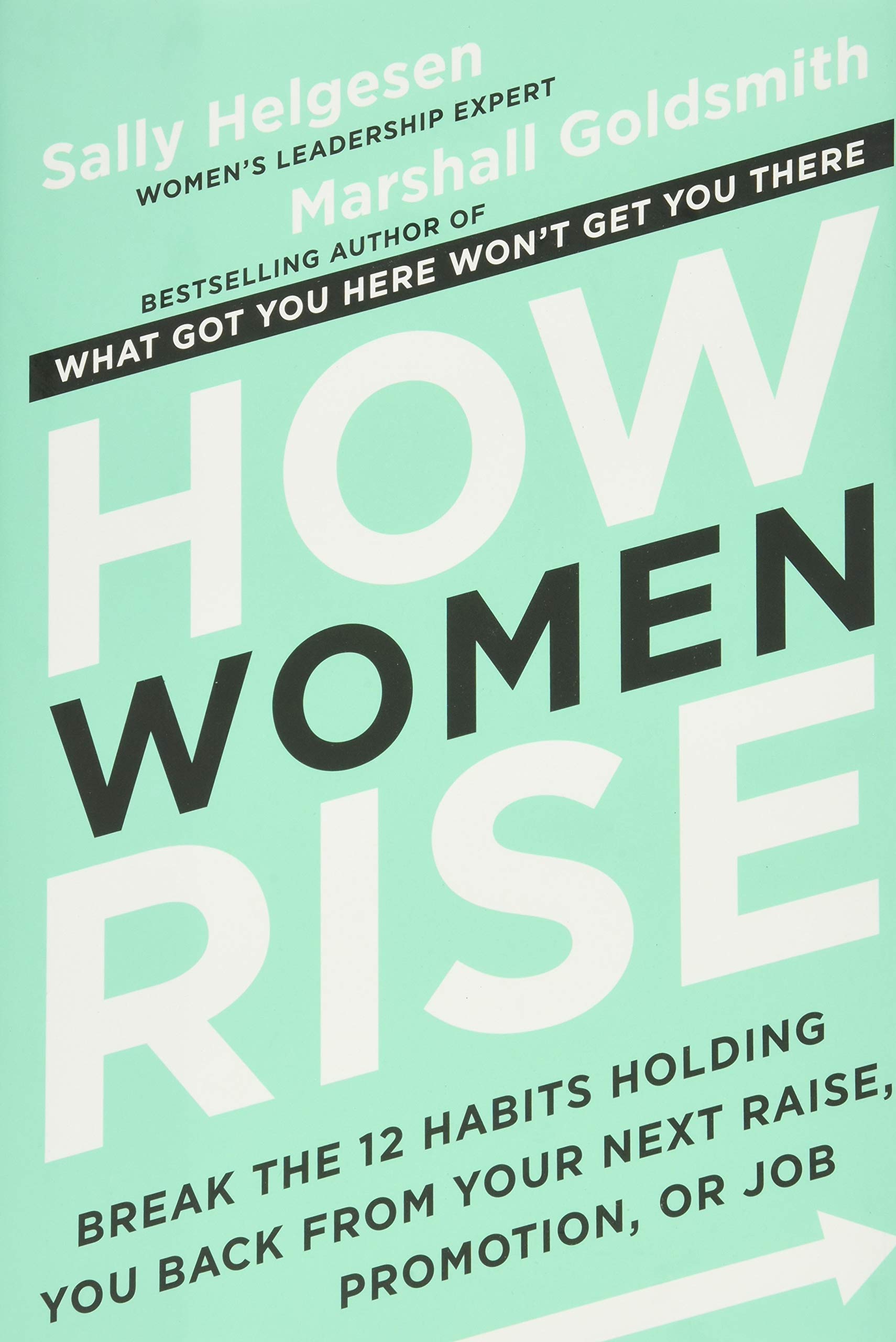What is Holding Women Back in Leadership? Impressions From "How Women Rise"
Summary of key ideas in "How Women Rise"
Sally Helgesen and Marshall Goldsmith have a combined six decades of professional experience coaching and working with women in virtually every sector. Their experience has taught them that even women at the highest levels can undermine themselves with specific self-sabotaging behaviors that are different from those that most frequently undermine men.
Of course, not all humans are alike. Gender is only one factor in leadership mindset and perception. That said, women often face various external barriers as they seek to advance in their careers, which shapes their work experience. Because experience shapes behavior, they may begin to influence how they respond, and responses, over time, become habits.
These external forces, such as
unconscious bias when promoting women, may not be within our control, but our behaviors are within each of our control. Using this example, we may not be able to persuade our companies to transform how they evaluate performance immediately, but we can start with being a voice to bring awareness to these unconscious biases.
How does this experience of work and unconscious bias manifest in women? Often it is simply described as being stuck. In research, women often will feel that something is preventing them from moving forward or leading the life they’re supposed to be living. They describe being unable to break through circumstances that are conspiring to hold them down; they feel as if their contributions are not recognized or appreciated. They feel that the people around them have no idea what they’re capable of achieving. This is all a perception, and although it may reflect a degree of truth, it is also important to consider how women most often may be keeping themselves stuck.
Identifying the behaviors that keep most women stuck is so important. Moreover, women can seriously strengthen their chances of success by uprooting any unhelpful habit, behavior, or attitude picked up over the course of their working lives. They can reframe assumptions that they once believed were intrinsic to their character. At a minimum, making the effort with these types of changes should improve daily work experiences and better prepare women to reach their goals in the future.
For anyone to let go of behavior that no longer serves them, we must first recognize it as a habit. Approaching behavioral change by substituting new habits for old ones is empowering. Spending time to figure out why the habit exists is not a good use of time, as our habits are not us but us on autopilot. By bringing a habit to conscious awareness, we can begin to try out new responses and see if they get different results. Working through this alone can feel awkward, vulnerable, foolish, and exposed. But when it works, it unleashes energy and confidence. And that energy makes it easier to stay with the effort.
At any age or developmental stage of our lives, human neural systems have the capacity to change by growing the new circuits that new skills and new behaviors require. Functional MRIs (fMRIs), which allow neuroscientists to view the brain in operation, confirm that the brain retains the capacity to build fresh neural pathways at every stage of healthy adulthood. As a result, we can rewire our brains to support new habits and thought patterns at any time during our life. The only catch is that we must be willing to repeat these new behaviors until our brain gets comfortable with them.
Past experiences may shape our behavior, but they need not determine it. Women pursuing leadership roles have the power to become more precise, intentional, present, assertive, autonomous, at ease exercising authority, confident in setting boundaries, and more effective at advocating for themselves. But the process can’t start until they identify those habits that hold them back and start practicing new habits that better serve their conscious future intentions.
Women's strengths are what got them where they are, and it is important to maintain a healthy respect for what has been achieved. For most women, certain characteristics emerge during their careers: diligence, conscientiousness, a concern for the feelings and contributions of others, and a reluctance to join the “it’s all about me” competition that characterizes life and politics in many organizations. These are gifts women bring to the world, and they surely have contributed to current successes in their companies. As women move higher up and expand their scope into leadership roles, we don’t want to leave these strengths behind. Nevertheless, as they strive to fulfill their potential as leaders, it is important to examine how these strengths may also undermine them. That’s why it is so important for women to find the balance to both celebrate the skills, talents, attitudes, and behaviors that have brought them to where they are while they continue to identify and work to surmount self-limiting behaviors and habits that won’t get them where they want to go.
12 Habits Holding Women Back From Their Next Raise, Promotion, or Job
Reluctance to Claim Achievements
- Usually rooted in genuine modesty and generous willingness to acknowledge the achievements of others.
- Gives you an excuse for buying into what is ultimately a rationale for staying in your comfort zone.
- While there’s nothing to gain by being obnoxious, shrinking into yourself in an effort to please isn’t going to benefit you — or other women.
- Indicates either/or thinking.
Expecting Others to Spontaneously Notice and Reward Your Contributions
- “Great work should speak for itself” is an excuse for refusing to claim your achievements, letting you off the hook if advocating for yourself makes you feel awkward.
Overvaluing Expertise
- Mastery of your current role often serves as a useful strategy for keeping yourself in your current role.
- If you want to rise in your field or your organization, expertise will only take you so far. That’s because the top jobs always require managing and leading people with expertise, not providing expertise yourself.
- Feeling fulfilled at work requires Mastery + Recognition
Just Building
- Women are often stellar relationship builders, but they tend to be less skilled at leveraging relationships and are noticeably reluctant to do so.
- Leveraging relationships is key to achieving professional success.
Failing to Enlist Allies from Day One
- Women tend to keep their heads down until they’ve mastered the details and are confident they can perform to a certain standard.
- Belief that you should not call on others for help until you’ve done your homework and know the parameters of your job
Putting Your Job Before Your Career
- Devoting so much time and energy to doing your job superbly that you’ve neglected to take the steps needed to propel you to the next level.
- This is most often rooted in loyalty — it’s the primary reason women stay in their jobs longer than men.
The Perfection Trap
- Perfectionism results in high-achieving women taking failures to heart and getting tangled up in self-blame stewing over mistakes instead of moving on.
- Women’s mistakes are often viewed more critically in male-dominated organizational cultures and often affect how other women in the company are viewed.
- Belief that you will succeed if you do your job perfectly and never mess anything up and often struggle with delegation and have difficulty letting others do their job
The Disease to Please
- Unselfish passion for making other people happy.
- As you move higher in the company, your to-do list becomes longer and the tasks involve higher stakes.
Minimizing
- Typically, women acknowledge others by minimizing the space they take up, even if it causes disruption.
- The key component of leadership presence is the opposite of cosmetic. It lies in the capacity to be fully present —for a task, conversation, moment, and opportunity. Present for your larger purpose in the world.
Too Much
- The whole business of emotional expression can be a landmine for women — they are more likely to display strong emotion in the form of anxiety, resentment, frustration or fear.
- Women over disclose usually because they assume that building good relationships and finding common ground requires sharing of personal information, or they’re convinced that being authentic depends on disclosure.
Ruminating
- Clinging to the past, routinely mulling over your mistakes, regrets, and negative experiences.
- The longer you ruminate, the longer you put off changing the behaviors causing you pain.
- Women spend more time reliving their setbacks and are more likely to believe that whatever went wrong was all their fault.
Letting Your Radar Distract You
- One of women’s greatest capacities is for broad spectrum notice — the ability to notice many things at once.
- Ability to understand what others are feeling and a broad-scale noticing capacity that makes you intuitive and empathetic.
Women in Agile Leadership
In addition to discussing this book in our community book club, we have wrapped some of the teachings into our Women in Agile Leadership program. We discuss these 12 habits, look at the risks associated with maintaining the status quo, and provide powerful reframes.
Learn more about this program and register for an upcoming session.
References
Helgesen, S & Goldsmith, M. How Women Rise: Break the 12 Habits Holding You Back from Your Next Raise, Promotion, Or Job. Boston: Hachette Books, 2018.







